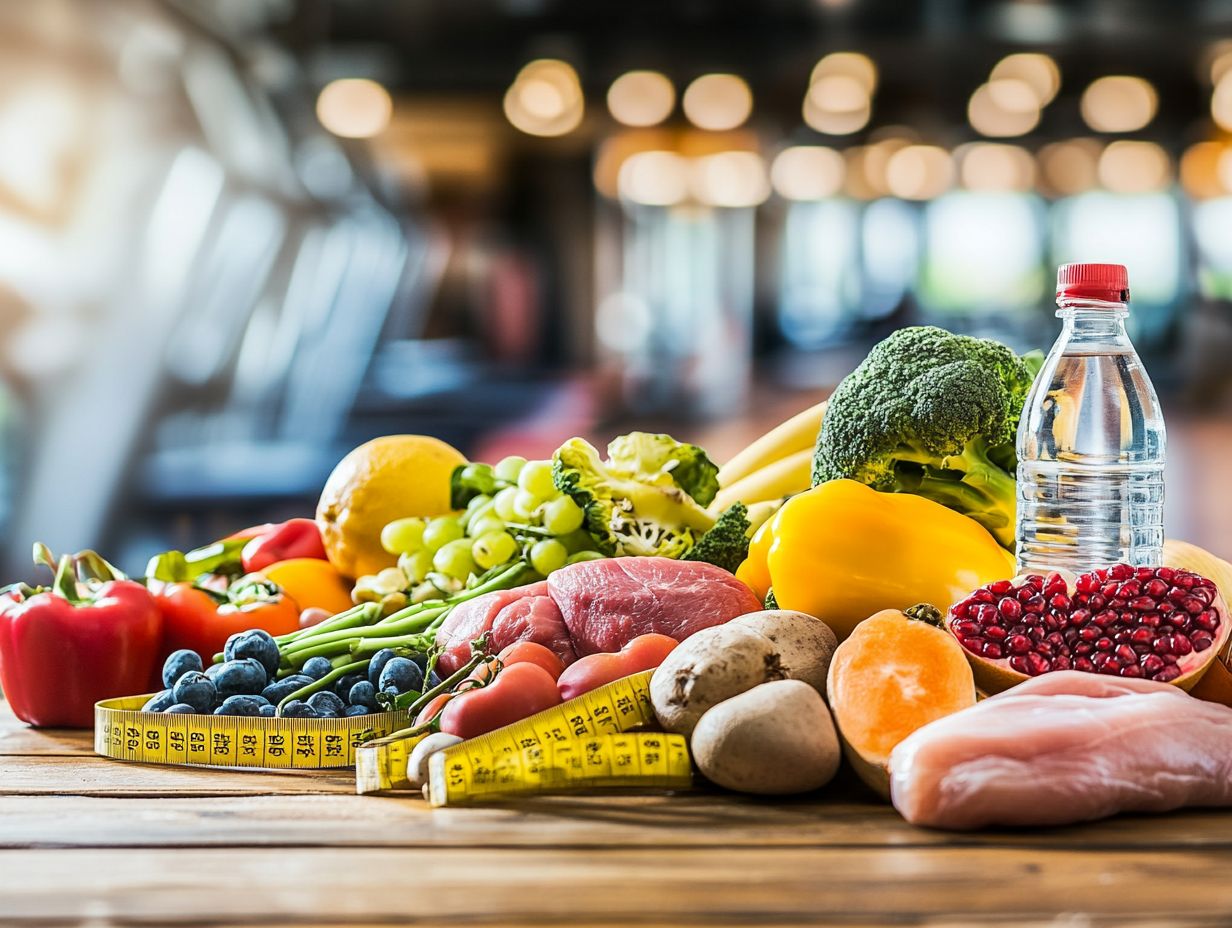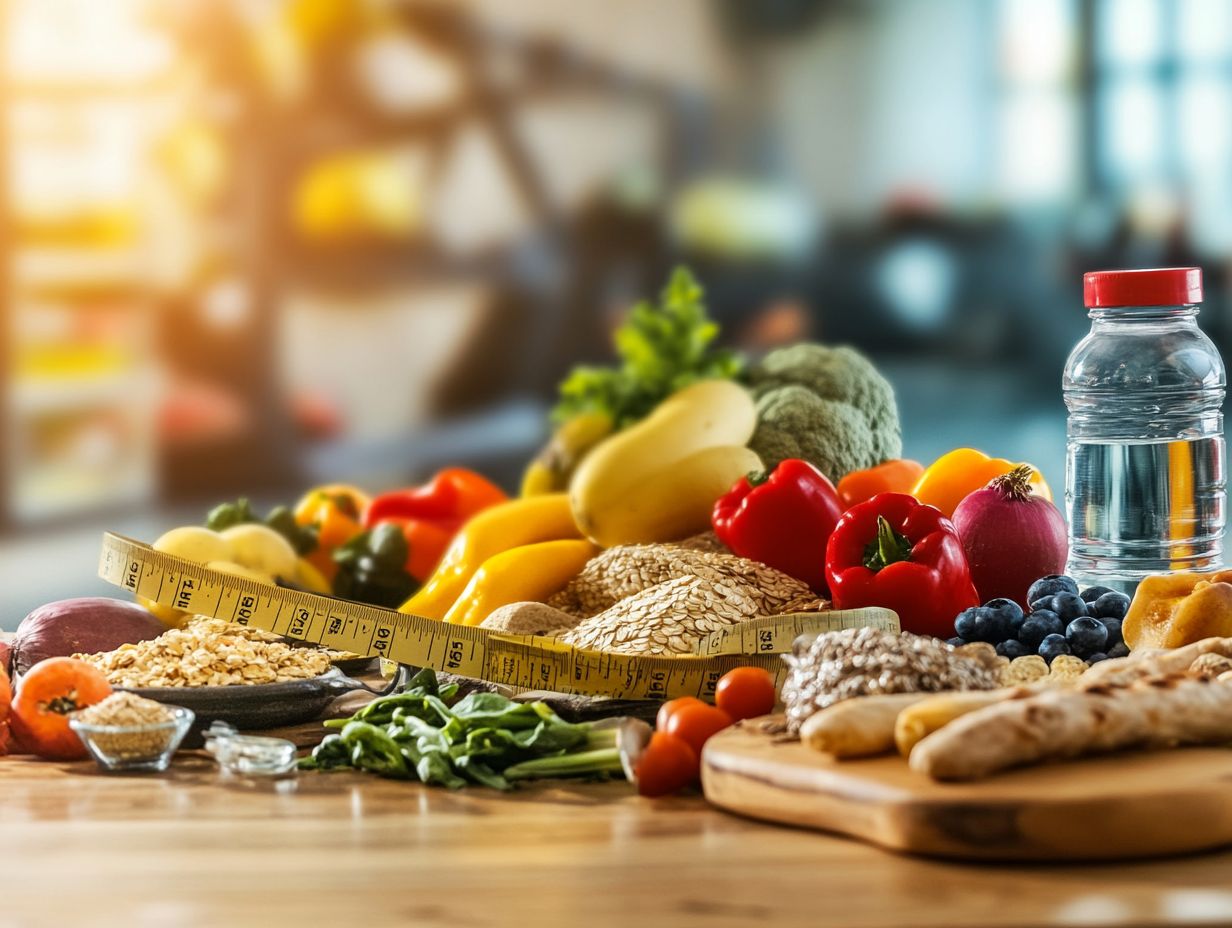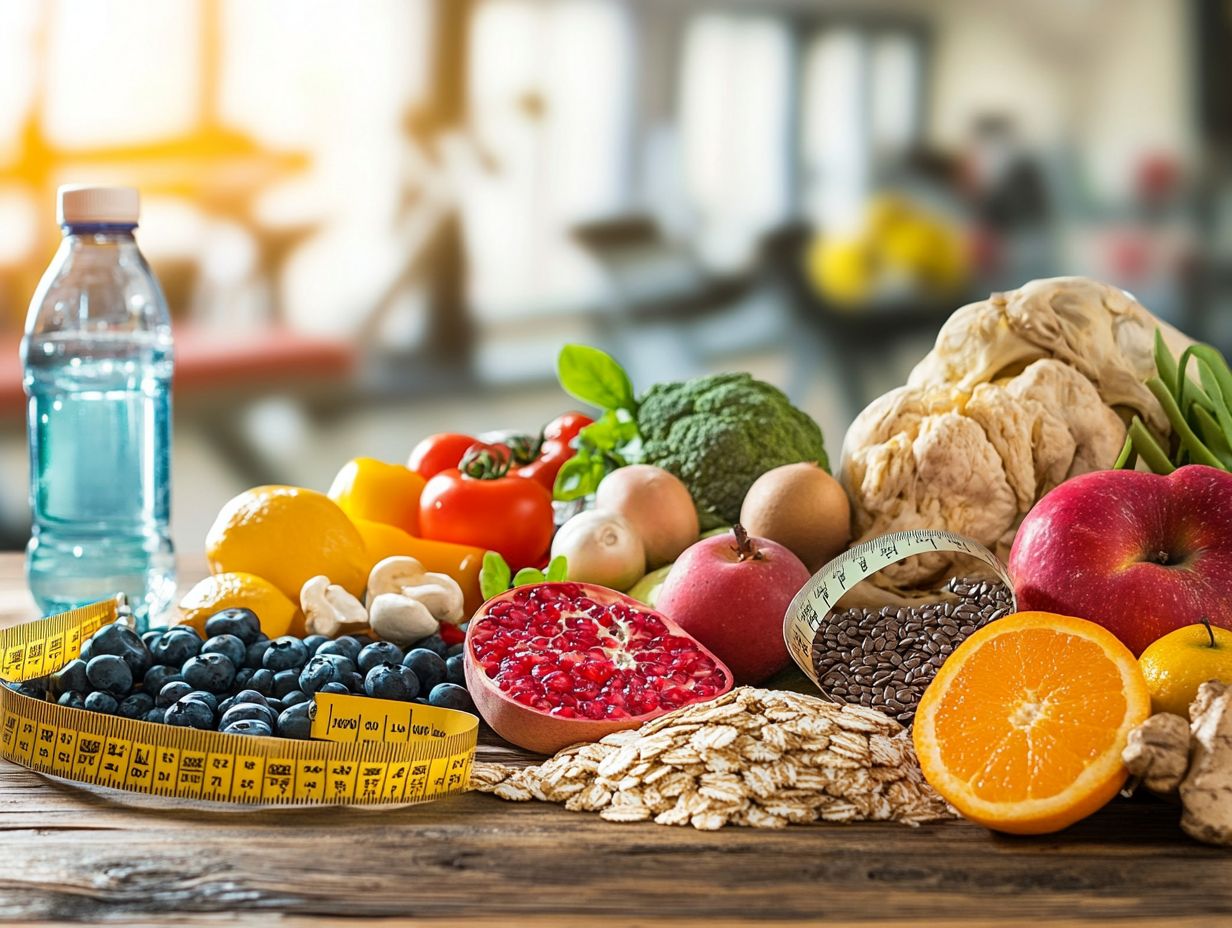How to Use Nutrition to Enhance Athletic Performance?
Nutrition is your game-changer as an athlete. It affects your energy levels, recovery time, and overall health.
This discussion focuses on a well-rounded diet tailored for athletes. It highlights macronutrients carbohydrates, proteins, and fats and the essential contributions of micronutrients like vitamins and minerals.
You ll discover the importance of meal timing and effective hydration strategies. Learn about the potential advantages of supplements as well.
Whether you re a seasoned competitor or just starting out, understanding these components will empower you to elevate your performance.
Contents
- Key Takeaways:
- The Role of Nutrition in Athletic Performance
- Macronutrients for Optimal Performance
- Micronutrients for Athletic Performance
- Timing and Meal Planning for Athletes
- Hydration for Athletic Performance
- Importance of Staying Hydrated and Tips for Proper Hydration
- Supplements for Athletic Performance
- Frequently Asked Questions
- What is the importance of nutrition in enhancing athletic performance?
- How can proper nutrition improve my athletic performance?
- What are some key nutrients that can enhance my athletic performance?
- What should I eat before a workout or competition to enhance my performance?
- How important is hydration for athletic performance?
- What are some common mistakes to avoid when using nutrition to enhance athletic performance?
Key Takeaways:

- Proper nutrition is crucial for enhancing athletic performance. It fuels your body for optimal functioning.
- A balanced diet with carbs, proteins, and fats is essential. It helps maintain energy, repair muscles, and support overall performance.
- Incorporating micronutrients from various fruits, vegetables, and whole foods supports energy production and muscle recovery.
The Role of Nutrition in Athletic Performance
Nutrition is vital for elevating your performance. It directly influences your energy levels, recovery, and health.
As an athlete, a balanced diet rich in essential nutrients is key. This includes both macronutrients and micronutrients to optimize your training.
A well-designed athlete diet should focus on whole foods, proper hydration, and energy needs. This approach allows you to excel during high-intensity workouts and manage your recovery nutrition effectively.
Why Nutrition is Important for Athletes
Nutrition directly impacts your energy levels, performance, and recovery time. It enables you to handle the demands of rigorous training.
Making the right dietary choices fuels your body for peak performance and aids recovery after exercise. For endurance athletes, a higher carbohydrate intake is essential for energy during long sessions. Strength trainers need to increase protein intake for muscle repair and growth.
Hydration is equally important. Proper fluid intake links to better physical performance and faster recovery. Understanding your nutritional needs based on exercise type and intensity is key for athletes aiming to excel.
Macronutrients for Optimal Performance
Macronutrients carbohydrates, proteins, and fats are crucial for athletes seeking peak performance. They provide the energy needed and support muscle growth during training.
Carbohydrates, Proteins, and Fats
Carbohydrates, proteins, and fats are essential in your diet. Carbs serve as your primary energy source, proteins support muscle growth, and fats provide sustained energy for longer activities.
To optimize performance, balance these macronutrients effectively. Carbs can be found in whole grains, fruits, and vegetables perfect for pre-training meals to boost energy.
Proteins are vital for recovery. Sources include lean meats, dairy, beans, and legumes, making them ideal post-workout. Don’t forget healthy fats. Incorporate avocados, nuts, and olive oil into your meals to enhance endurance.
By weaving these foods into your daily routine, you ll meet your nutritional needs for peak performance.
Micronutrients for Athletic Performance

Micronutrients are essential vitamins and minerals for athletes like you. They help you recover and boost your energy. This is crucial for optimizing your athletic performance and maintaining your physical health.
Prioritizing these nutrients gives you the power to reach your peak potential.
Vitamins and Minerals for Energy and Recovery
Vitamins and minerals are essential micronutrients that elevate your energy levels and aid recovery. This enables you to navigate physical demands and maintain overall health.
Each nutrient plays a specific role. For instance, B vitamins, especially B12 and riboflavin, help turn food into energy. Meanwhile, magnesium is key for muscle function and recovery. By incorporating foods like leafy greens, nuts, and whole grains into your diet, you can enhance your intake of these vital micronutrients.
Vitamin C and zinc are essential for boosting your immune system, helping you fend off illness and sustain peak performance. Citrus fruits, berries, and seeds should be staples in your diet. By prioritizing a diverse array of whole foods, you ensure adequate nutrient intake and boost your overall vitality, setting the stage for successful training and competition.
Timing and Meal Planning for Athletes
As an athlete, mastering meal timing and planning is key to your success! By strategically scheduling your nutrition, you can enhance your performance and accelerate your recovery.
Thoughtful nutrient timing around your training sessions can make all the difference in optimizing your results.
Pre- and Post-Workout Nutrition
Pre- and post-workout nutrition are vital aspects of your athletic diet. They directly impact your energy levels, performance, and recovery through the art of strategic nutrient timing.
To achieve optimal results, aim to incorporate complex carbohydrates, lean proteins, and healthy fats into your meals. A pre-workout meal rich in carbohydrates think oatmeal or whole-grain toast paired with protein, such as Greek yogurt or a protein shake, should be consumed about 30 to 60 minutes before your workout. This powerful combination fuels your body and helps sustain your energy levels.
After your training session, focus on recovery. Aim for a recommended ratio of 3:1 carbs to protein; options like a banana with a protein smoothie or a quinoa salad will effectively replenish your glycogen stores and support muscle repair. Don’t forget eating within 30 minutes after your workout is crucial! It can supercharge your recovery.
Hydration for Athletic Performance
Hydration plays a pivotal role in enhancing athletic performance. Maintaining optimal fluid levels is vital for your energy, endurance, and overall health. Ensuring you stay adequately hydrated gives you the power to perform at your peak, unlocking your full potential during every event.
Importance of Staying Hydrated and Tips for Proper Hydration

Staying hydrated is essential for you as an athlete. Proper fluid intake can elevate your performance and aid in recovery. It helps steer you clear of dehydration issues during training and competitions.
To optimize your hydration, aim to consume at least 3 liters of fluids daily. This amount may vary depending on your activity levels and the climate you’re in. Be attentive to the early signs of dehydration, such as a dry mouth, fatigue, or reduced urine output. These can significantly impact your performance.
Incorporating a mix of water and electrolyte-rich beverages is particularly beneficial during intense workouts lasting over an hour. Remember to hydrate before, during, and after your exercise sessions to keep your body nourished.
A consistent hydration routine boosts your energy levels and supports your overall health and athletic prowess.
Supplements for Athletic Performance
Supplements can be valuable allies in your quest to enhance athletic performance. They provide essential nutrients that might be missing from your diet, helping to boost energy production and facilitate recovery.
Embracing the right supplements can elevate your game and support your journey toward peak performance.
Common Supplements and Their Effects on Performance
Common supplements like protein powder and creatine can enhance your performance by boosting energy production and aiding muscle recovery.
Protein powder supplies essential amino acids crucial for muscle repair and growth. Creatine boosts the production of ATP, the energy source for your cells. Research shows that athletes using these supplements often enjoy faster recovery times and improved endurance.
A thoughtful supplementation strategy combined with a balanced diet rich in whole foods can significantly amplify your training results. This approach not only helps you perform your best but also minimizes the risk of injury.
Frequently Asked Questions
What is the importance of nutrition in enhancing athletic performance?
Nutrition is crucial for providing the energy and nutrients needed for optimal athletic performance. Following guidelines on nutrition for athletes affects an athlete’s strength, endurance, and overall health.
How can proper nutrition improve my athletic performance?

Fueling your body with the right nutrients can improve your energy levels, help you build and repair muscle, and maintain a healthy weight. For athletes, understanding nutrition for athletes: fueling your performance is essential, as all these factors contribute to enhanced athletic performance.
What are some key nutrients that can enhance my athletic performance?
Essential nutrients for athletes include:
- Carbohydrates for energy
- Protein for muscle recovery and repair
- Healthy fats for endurance
- Vitamins and minerals for overall health and performance
What should I eat before a workout or competition to enhance my performance?
A meal or snack high in complex carbohydrates, moderate in protein, and low in fat is recommended before a workout or competition. This combination provides sustained energy and prevents stomach discomfort.
How important is hydration for athletic performance?
Staying hydrated is crucial for maintaining performance and preventing fatigue and muscle cramps. Make sure to drink water before, during, and after exercise to replenish lost fluids.
What are some common mistakes to avoid when using nutrition to enhance athletic performance?
Avoid extreme diets, skipping meals, and not consuming enough carbohydrates. These common mistakes can hinder performance. It’s vital to listen to your body and fuel it properly with a balanced and varied diet.
Stay hydrated, fuel your body, and watch your performance soar!





